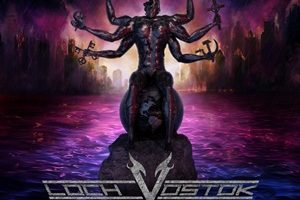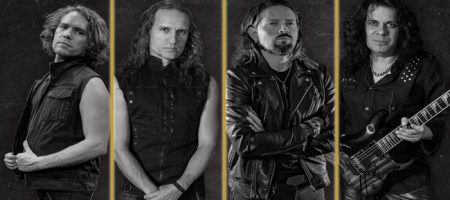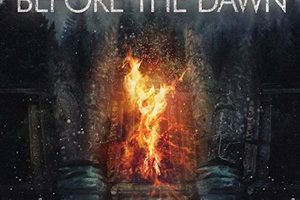Sermon – Blurring Boundaries
Sunday, 16th April 2023
A progressive outlook with touches of melancholy, darkness, and despair – Sermon represents a multi-sensory approach to music that’s rarely delivered in quite this combination these days. Many will think of aspects of Katatonia, Tool, or Porcupine Tree when it comes to the layers of guitars, bass, drumming and haunting vocals when taking in this material. The second album Of Golden Verse presents another treasure trove of sonic bliss – propulsive, alluring, hypnotic, heightened in the diverse nature of each arrangement.
We spoke to the main driving force for Sermon – the anonymous Him – regarding the differences between atmosphere with the new record, what drummer James Stewart and producer Scott Atkins add to the mix, the cover art/ lyrical tie ins, thoughts on the band’s first live show and if/when future shows will occur, his love of cooking, plus insight into what may happen for album three.
Dead Rhetoric: The latest Sermon album is Of Golden Verse – and you discuss in the background information that for this second record, you upped the level of aggression without intending to. Now able to appreciate the completion of the record, what circumstances took place that caused this to be a natural evolution from the sad atmosphere portrayed on your debut album from 2019 Birth of the Marvellous?
Him: It was quite a few things in life that were going in a way that I didn’t quite want them to. I suppose work wasn’t going particularly well, a relationship ended with someone. By no means is it a love album – when everything goes wrong at once, you end up feeling really frustrated with everything else. That threads its way into the rest of your life. So, it was kind of like that, I wasn’t angry every day, but there was a simmering rage if you know what I mean.
Dead Rhetoric: Did the pandemic have an effect as well on the recording and writing process?
Him: Actually, the pandemic completely hurt it. It was going really well until that hit, and it made me give up. So, in that sense it’s not a pandemic album. I found it not creatively good – but I know that James for example liked having the time off for the first time in ten years, basically. He didn’t enjoy the people dying. I didn’t find it fruitful, but when all the restrictions started to lift, and we could actually get to record things, it gave me a bit more of a fire to put together the demos and start again.
Dead Rhetoric: How does the drumming of James Stewart as well as the production work of Scott Atkins transform these tracks into something that much more special and unique for Sermon? Can you think back to specific instances where their skill sets shined on the new album?
Him: They make all the difference, really. I will make a demo with MIDI-drums, and that will give a good skeleton of what I think should happen. Then when James goes to the studio if he has more ideas, we can add to that. I don’t really fight it, as long as he keeps the pace, I don’t mind his suggestions. He gives the material energy that you can’t really get with programmed drums. I love working with Scott because he pushes the performances. He will not rest until he thinks he’s gotten the best out of you. It can be tiring, but it makes the album because I’m fairly lazy. I’ll just be like, that’s fine – and go to the next idea. He won’t allow that. That’s why he’s really important – he’s the difference in the way people will interpret my ideas.
There is a part particularly on “Wake the Silent”, I had the main drumbeat/rhythm, quite a machine gun type double kick. I used it quite a lot throughout the song, and James was getting bored with it, so he added a cool breakdown bit before the second chorus, some cool snare parts. It really brought it to life. He did this cool thing, instead of doing what I planned on the crash cymbal, he did this on the hi-hat, opens up the sound. In that way, it really changes the way the song is heard – otherwise it would have been a bit more repetitive. And Scott, he doesn’t tend to rewrite my songs. He plays a role in other bands and the way songs are structured. He’ll tell me whether a vocal part is hitting or creating the right contrast, if I am saying the words wrong, if it should be a different word. Scott’s role is the binding of everything, the finishing process. It’s super important because otherwise it would sound like a demo.
Dead Rhetoric: When it comes to your personal performances, which is more challenging – the musical parts or the vocal components?
Him: Recording four layers of guitars, I fucking hate it. I find it really boring and time-consuming. I’m not a bad guitar player, but I’m not a virtuoso. I would say I’m a less practiced singer than I am a guitar player. But I think I handle vocals pretty good with this. It’s not perfect, but singing is the thing I would like to be better at out of the two. I think that’s the most challenging, because that’s the thing you are most nervous about. Whereas with the guitars I’m just bored.
Dead Rhetoric: Do you find you have to be in a certain mood or environment to capture the best ideas either musically or lyrically for Sermon?
Him: Yes, and to not be thinking about it. I have to have a sketch or an idea. And if I get stuck, the best thing I find is to just walk away from it, and let my brain relax. Think about it at any time it wants. Active thinking doesn’t help push the song in the right direction, if that makes sense.
Dead Rhetoric: What song on the record took on the greatest transformation from initial demo to final edition?
Him: Probably either “Golden” or “Departure” I would say. The chorus I had for “Golden” I had for months in my head, and when I first heard it back when I got the mixes, it gave me a shiver, because it was exactly how I wanted it to be. Whereas some of the other songs, I’m proud of all of them, my brain can’t help but nitpick and think I could have done things differently here.
Dead Rhetoric: What can you tell us about the cover art and how it ties into the lyrical stories for Of Golden Verse?
Him: The cover art took me a long, long time to do. It took many failed attempts with many failed ideas. Essentially the album is about abuses of power within reality, and how we have to live in a very complex set of rules and structures and a lot of time it’s certainly not perfect and not very neat. It actually falls apart. The sequences of the door, the door bursts open and breaks. It’s an analogy of very complex structures that are falling apart.
Dead Rhetoric: Do you enjoy the element of mystery and mystique surrounding your persona? Does this aid the cause for listeners to use their eyes and ears in a different way to embrace more of the musical experience the way you intend them to?
Him: I am not very good, in these interviews, I’m really open and very much myself like I am every day. It’s not really in character. But the visual side of it, the concealing of my identity and name, helps take the music to another place. Some people can see this as stupid and gimmicky, and I can see that. It might look a little bit childish, maybe. But the truth is I’m such a boring looking person that it just wouldn’t fit the type of music I do. For example, my current girlfriend did not have a clue that I did this. I think when she heard it, she was a bit shocked, because I don’t look like that guy that would do this.
Out of the two things that I thought we would get apprehension for, the mask and the concealment of my identity help take the music to a more fantastical place than my boring face otherwise would.
Dead Rhetoric: Does this also make your conscientious of how you present the band through social media platforms?
Him: Yeah, in a way. I don’t think I would upload pictures of rehearsals or just me in my flat. Live pictures would be fine, photos with fans should they happen. The final process sort of stuff – not really the behind the scenes types of things. There are no pictures of us recording, but I have loads of videos on my phone.
Dead Rhetoric: Sermon has only played one live show to date – at Prog in Park in Poland. What was that experience like for you and the band – and are you hopeful that there will be more opportunities to showcase the band live in support of this record, even if it’s on a limited one-off show or festival basis?
Him: Yeah, I would love to. I hope it happens. We need offers, because I don’t really know many people in the industry. In terms of what that first show was like, I had never been on stage in my life. Suddenly I find myself supporting Opeth and Alcest, in front of 3,000-4,000 people. I shit a brick, honestly. The first song I was really nervous, and there is one recording of that on YouTube, and I fuck up a note so bad. After that, everything was fine – and I wish someone had captured some of the other songs. It was scary, yeah.
The main issue is, Sermon is not really a proper band. We have a bunch of people who are willing to play, but until there’s… I don’t like the idea of asking them to do this for free. It’s not really something I want to play in the back of a pub, it’s waiting for someone to offer something to us. I was really lucky last time, Andy Farrow, Opeth’s manager got in touch with us the last time. I had to let him down, we tried to play the Prognosis festival in the Netherlands, and it was rescheduled two or three times. On the final time, none of the other people could play the show because of the tours they had backed up for the same reason, were rescheduled at this time. I feel really bad about it still.
Dead Rhetoric: How do you feel about being a part of the Prosthetic Records roster? Do they have a good understanding of what you are trying to get across with Sermon?
Him: They are great guys. They really care about things. The truth is the marketing side of things to get this out to the right audience costs infinitely more than the cost to record the album itself. I don’t think we are a particularly safe bet, as I don’t have a band that I can go out on the road with and tour. To give us tens of thousands of pounds to do marketing campaigns it’s tough. With that said, they have a great PR team, Nikki is amazing. I was introduced to her by Prosthetic, she’s been wonderful. The media space can be really competitive. We’ve got great reviews, and hopefully it grows slowly. Let’s be honest, it’s not radio rock. I’m not expecting to make a living from this. They are great, but I wish there was more.
Dead Rhetoric: What does success mean to Sermon at this point in your career arc? If you had an unlimited budget with any resources available, what would you envision for the band to accomplish in terms of your craft?
Him: With this album my original vision was to make a series of short films to go to tell a story for each of the singles that we are releasing, building up the album properly with a story. There just wasn’t the budget to do it. Then it would be to take things on the road. I would like to make the live shows really beautiful, I think. It doesn’t have to be like fire cabins or anything. Making people forget that they are watching a band play, that’s what I want from a Sermon performance. People are removed from the room and be consumed by the sound and light, essentially. It’s expensive to do that. One day maybe, if we can get it there.
It would be nice for (this) to be more widely acknowledged; I think. It doesn’t make me want to write music, but it can feel… I feel like there is potential for some of these songs to be catchy in a way. It would be to reach a wider audience and break-even as well. I don’t really care about making money, but it would be nice for things to be self-sustaining. It would mean that we could really honor the material a lot more.
Dead Rhetoric: What do you consider three of the most important albums that helped shape your views or outlook on music – and what’s the best concert memory you ever have attending a show, and what made that so special or memorable for you?
Him: That’s a good question. Life changing albums, I would say is Opeth – Still Life. King Crimson – 21st Century Schizoid Man. And then, Wovenhand – Ten Stones. And the concert experiences, I have two that come to mind. The one that changed my life I would say, it wasn’t the most grand or epic show, but it was Opeth – Lamentations at Shepherd’s Bush Empire, for their first DVD. My friends dad took me and my friend to this gig when we were thirteen, fourteen. I had never heard anything like this before, when they played that second set, I lost my mind. It changed who I am. But then the best live band, I would say, is probably Tool. It’s an all-encapsulating thing. I think the visuals are stunning. Even if they are not your favorite band, there is something to just be admired on the scale of what they are doing. It’s not just a bunch of projections or fireworks, they are carefully considered.
Dead Rhetoric: What would surprise people to learn about Him, the person away from music when you have the free time and energy to pursue other passions, activities, and interests?
Him: No one has ever asked me that before. I’m obsessed with cooking. I read cookbooks for fun. If I could sort of start again, I would probably go down that route for a living. Apart from that, I’m a normal person. I like going to the pub, I like hanging out with friends. I don’t listen to a lot of music very much. I’m really good at making pies. I can spend days with the filling, making all the pastry, everything. I love making things like pasta, I will spend two- or three-days making soup from a book the other day. A Taiwanese beef noodle soup. I’m just fascinated by it, I like making things – whether it’s food, music, or design. I just love doing that.
Dead Rhetoric: What’s on the horizon for Sermon over the next year or so to promote this release? Has work already started behind the scenes on the follow-up – and if so, will the direction again evolve or grow from the first two releases?
Him: I honestly don’t have any plans. I was hoping that people would get in touch and be like ‘we will put you up at a festival’ or something. But it hasn’t happened yet. It’s only been a week (since the album release), so you can’t speak of too much. I’m waiting for people to give us an opportunity.
In terms of the third album. I’m not sure where to turn yet, I always have ideas. I have a title, but I don’t have a solid musical idea through it yet. I don’t want it to be another Of Golden Verse, but I don’t know how much I want it to be like that yet. I would like to make something a little catchier, and more as separate songs rather than a single journey. I always think I like to listen to albums that have one very fluid experience. I don’t know, I’m all quite lost with it.




























